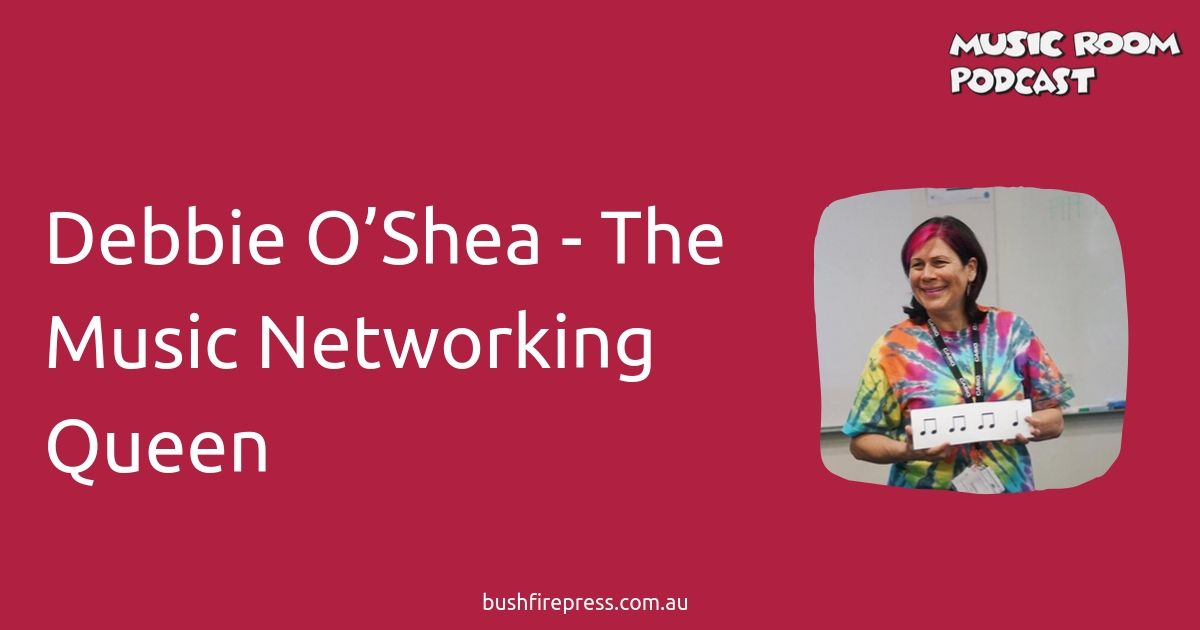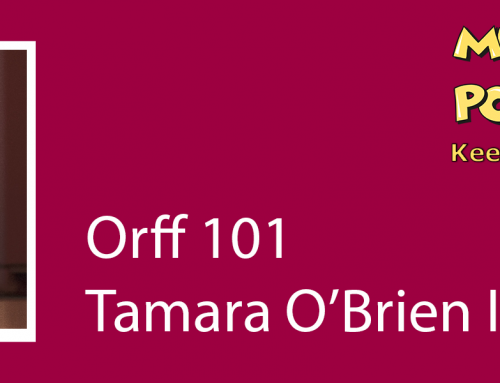Music teachers thrive most when they network with other music teacher and share their challenges, experiences, tips and stories. One teacher who knows this better than most is Debbie O’Shea, a self-professed ‘Networking Queen’.
Debbie is a Brisbane-based music teacher and the founder of Crescendo Music Education. After almost 40 years in the profession, Debbie says you can never stop learning. She doesn’t pretend to have all the answers and loves being a resource to help others find out what they need to know on their music teaching journey.
Debbie shared why networking among music teachers is a great way to share, support and inspire each other. She also shared some of her favourite networking tips and ideas.
MUSIC ROOM PODCAST HOME PAGE:
www.musicroom.net.au
SUBSCRIBE HERE:
Email | Apple Podcast | Stitcher | Subscribe on Android | Player.fm | RSS | Spotify
Debbie had five reasons for becoming the Networking Queen but has since developed two more…
- Reason # 1 – Meeting the need to be sociable and to connect. This reduces feelings of isolation and creates opportunities to: find work (professional and voluntary); advance your career; find performance opportunities for yourself and/or your students; make contact with composers and/or conductors. You never know where connections might lead.
- Reason #2 – Create a sense of belonging or ‘tribe’. This creates and builds relationships, both professional and personal.
- Reason #3 – Support. Networking allows you to find mentors and peers to help find solutions to specific problems.
- Reason #4 – Teaching ideas can be found and learned through networking with others.
- Reason #5 – Being in the company of others leads to increased motivation and inspiration
Then she added a couple of extra reasons …
- Reason #6 – Personal development benefits arising from being with others include: Improved communications skills; discovery of relevant research; discovery of new areas to study; tolerance and patience; and vulnerability.
- Reason #7 – Networking provides opportunities to give through sharing and ‘paying forward’ which in turn can lead to collaboration opportunities.
Debbie also shared her top ten tips for networking.
- Tip #1 – Join Professional Associations.
The cost is worth it but if it’s prohibitive for you, see if your school can pay the relevant fees
Debbie belongs to KMEIA, ASME, ANCA, and could be in many more, but had to draw the line. (see below for links to these associations).
Become involved in the associations. Read the newsletters and join in discussions and even committees.
If you are in a regional area, consider forming and hosting a local chapter for the association(s).
Consider some of the less well-known associations as well.
- Tip # 2 – Network directly with your colleagues.
Having someone you can trust is valuable, especially when you need to vent (but don’t cross the line into whingeing!)
Gravitate towards the colleagues that are naturally helpful and ‘useful’. They will often offer repertoire ideas, and will be good listeners.
Create opportunities to observe each other in classroom situations. That’s where the real learning happens!
- Tip #3 – Always be developing professionally.
Attend as many professional development workshops are you are able to. Apart from the learning opportunities, these are great opportunities to network with your peers.
- Tip #4 – Make use of Facebook Groups. These are a great way to meet others outside your immediate area and to learn and share your knowledge. Some of Debbie’s recommended groups are in the Useful Links section below.
- Tip #5 – Make use of work chat groups. You may or may not have one at your workplace but often larger institutions, education bodies and government bodies have internal chat groups that can be used for networking.
- Tip #6 – Make use of blogs. Apart from being a great source of information, you can also find out from blogs who is doing what in the field of music and perhaps even connect with the blog writer.
- Tip #7 – Listen to podcasts. Debbie is a self-confessed podcast-a-holic and uses them not just for knowledge about music teaching but also for personal development, business information, marketing knowledge and more. (Debbie’s daily commute is about 35 minutes each way so this episode is almost a perfect fit for her :-).
- Tip #8 – Make use of Pinterest. This is a minefield of information for music teachers. Just watch you don’t get too distracted though :-).
- Tip #9 – Make use of YouTube. Equally as useful as Pinterest, if not more.
- Tip #10 – Visit the Crescendo music education website. Debbie’s hub for supporting and connecting music educators. (See link in the Useful Links section below).
Recipe
Puccini loved beans so much that he sent his publisher, Giulio Ricordi, some “very special” beans and a recipe to prepare them. Curiously, the nota bene provides more information than then recipe itself!
“Put them on the fire in cold water, which should be a moderate amount – neither too much nor too little. Boil for two hours on a small fire, and when they are cooked, there should be no more than three or four spoonfuls of liquid.
N.B. When you put them on to cook add four or five leaves of sage, two or three heads of garlic, salt, and pepper, and when the beans are half cooked, add a little oil to boil them with.”
Quote
“Without music, life would be a mistake” – Friedrich Nietzsche
Useful Links
Music Room Podcast Home – www.musicroom.net.au
Professional Associations
Facebook Groups and Pages
Music Teachers Group (over 30,000 members)
Bushfire Press Facebook Community (for discussions and info)
Mark Leehy Email – mark@bushfirepress.com
SUBSCRIBE FOR UPDATES VIA EMAIL OF THE MUSIC ROOM PODCAST
We’ll let you know via email when we release new episodes






